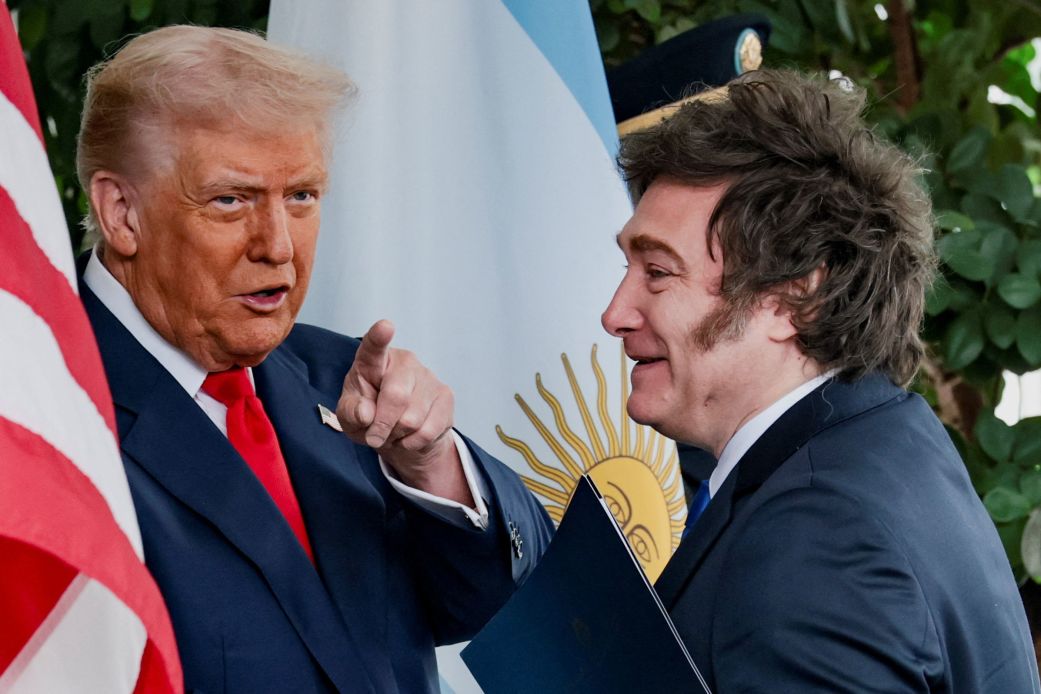In a move that has sparked both praise from free-market enthusiasts and sharp criticism from fiscal conservatives, President Donald Trump has extended a staggering $20 billion currency swap to Argentina, aimed at rescuing the South American nation’s spiraling economy.
Announced in late September 2025 and finalized amid high-stakes White House meetings this week, the deal—structured as an exchange of U.S. dollars for volatile Argentine pesos—comes at a pivotal moment for President Javier Milei, Trump’s ideological soulmate in the fight against socialism and bloated bureaucracies.
But as American taxpayers foot the bill, a pressing question looms: Is this generosity worth the gamble? And in an era of domestic decay, shouldn’t the U.S. slam the door on foreign aid altogether, turning inward to heal its own wounds?
To understand the “why” behind this infusion of cash, one must trace the threads of geopolitics, personal affinity, and raw economic self-interest. Argentina, long plagued by hyperinflation, debt defaults, and political turmoil, hit a breaking point earlier this year. The peso plummeted amid investor flight, exacerbated by Milei’s radical austerity measures—slashing government spending, deregulating industries, and wielding his infamous chainsaw as a symbol of fiscal carnage.
These reforms, while lauded by libertarians, triggered short-term pain: unemployment spiked, poverty deepened, and Milei’s party suffered a humiliating defeat in provincial elections last month. Without intervention, analysts warned of a full-blown meltdown that could ripple through Latin America, destabilizing trade partners and inflating global commodity prices.
Enter Trump, who views Milei not just as a leader but as a hemispheric vanguard for “America First” principles abroad. During a October 14, 2025, White House summit, Trump hailed the aid as support for “a great financial philosophy” and “our neighbors,” while Treasury Secretary Scott Bessent framed it as a strategic firewall against economic contagion. But peel back the rhetoric, and crisper motives emerge. Chief among them: countering China’s creeping influence in the Southern Cone.
Beijing already holds an $18 billion swap line with Buenos Aires and has snapped up billions in Argentine soybeans, sidelining U.S. farmers amid Trump’s ongoing trade war with the People’s Republic. By dangling this lifeline, Washington aims to tether Argentina closer to its orbit, potentially securing mining rights, trade deals, and a bulwark against Beijing’s Belt and Road encroachments. There’s even talk of doubling down with another $20 billion from private banks and sovereign funds, underscoring the administration’s long-game vision for a pro-U.S. Latin America.
Yet, for all its strategic sheen, is this $20 billion truly worth it? On balance, the scales tip toward skepticism. Proponents argue it’s a savvy investment: stabilizing Argentina could safeguard U.S. exports, prevent a refugee surge at the southern border, and amplify Milei’s reforms as a model for debt-ridden allies like Brazil or Mexico. Bessent has insisted it’s no handout but a “private-sector solution” with strings attached—contingent on Milei’s coalition prevailing in October’s midterm elections and sticking to free-market orthodoxy.
If successful, it might yield dividends in the form of lithium-rich mining concessions (Argentina boasts vast reserves critical for U.S. electric vehicles) and a diluted Chinese footprint. Historical precedents, like the 1995 $12 billion Mexican bailout, bolster this case; that package averted a broader peso crisis and preserved NAFTA’s momentum.
Critics, however, see a high-risk crapshoot dressed in patriotic garb. Argentina’s track record is abysmal—nine sovereign defaults since independence, including a fresh IMF tussle just months ago. Handing over dollars for devalued pesos feels like betting on a horse that’s already lame, especially when U.S. farmers are hemorrhaging from lost soybean sales to Chinese buyers favoring Argentine fields.
Congressional Democrats have decried it as crony capitalism, with whispers of lobbying by Trump’s billionaire allies poised to profit from privatized Argentine assets. And politically? Trump has bluntly tied the funds to Milei’s electoral fortunes, warning he’ll “waste no time” if the chainsaw-wielder falters—a naked quid pro quo that reeks of interventionism, not isolationism. At $20 billion (potentially $40 billion total), that’s real money—equivalent to funding border security for a year or jumpstarting domestic infrastructure without hiking taxes. In a zero-sum world, every peso propped up abroad is a dollar denied to American heartlands reeling from inflation and offshoring.
This Argentina episode crystallizes a deeper rot in U.S. foreign policy: the addiction to aid as a tool of empire, when America itself is fraying at the seams. It’s time—overdue, in fact—for a full-spectrum retraction of foreign aid, redirecting every cent inward to rebuild the republic. The U.S. shells out over $50 billion annually in bilateral assistance, plus multilateral commitments through bodies like the IMF, often propping up regimes with dubious track records.
Why? Partly, yes, to export our inflation: by flooding global markets with dollars via swaps and loans, we dilute domestic purchasing power, quietly offloading the Federal Reserve’s money-printing sins onto trading partners. It’s a sneaky subsidy for endless deficits, letting Uncle Sam print without immediate pain at home—but at the cost of eroding allies’ sovereignty and breeding resentment.
More insidiously, this largesse sustains a web of compromised bureaucracies, where foreign interests burrow into Washington’s corridors like termites in oak. Think tanks funded by Gulf petrodollars, lobbyists greased by Beijing’s united front, or EU diplomats whispering in State Department ears—our aid apparatus is a sieve for influence peddling. The Argentina deal exemplifies it: sidestepping the IMF for a direct Treasury play might shield against multilateral meddling, but it also invites accusations of favoritism toward Milei’s camp, potentially alienating neutral actors and empowering Trump’s personal network over national strategy. These entanglements distort priorities, funneling resources to far-flung fixes while bridges crumble in Pittsburgh and schools shutter in rural Ohio.
Retracting aid isn’t isolationism; it’s realism reborn. Imagine reallocating that $20 billion: fortifying supply chains gutted by globalization, subsidizing apprenticeships in rust-belt factories, or slashing red tape for small businesses crushed by regulatory bloat. Trump’s own “America First” ethos promised as much—tariffs on adversaries, yes, but tariffs funded by domestic reinvestment, not foreign bailouts.
By investing in ourselves—upgrading ports, retraining workers, and igniting an energy renaissance—we’d forge resilience against shocks, from pandemics to peer aggressors. Argentina’s woes are tragic, but they’re theirs to solve; Milei’s chainsaw must cut without American strings, lest we perpetuate a cycle of dependency that weakens us all.
In the end, Trump’s Argentine gambit is a microcosm of empire’s temptations: noble in intent, perilous in execution. Worth it? Only if dividends flow swiftly and surely—but history whispers caution. The real win lies not in propping up pesos, but in reclaiming dollars for the dollar’s birthplace. America awake: retract, rebuild, reclaim. Your future depends on it.









Share:
Trump’s Commutation of George Santos: Justice or Political Mercy?
Nick Fuentes’ Spotify Surge: A Snapshot of Popularity, Censorship, and Shifting Free Speech Tides